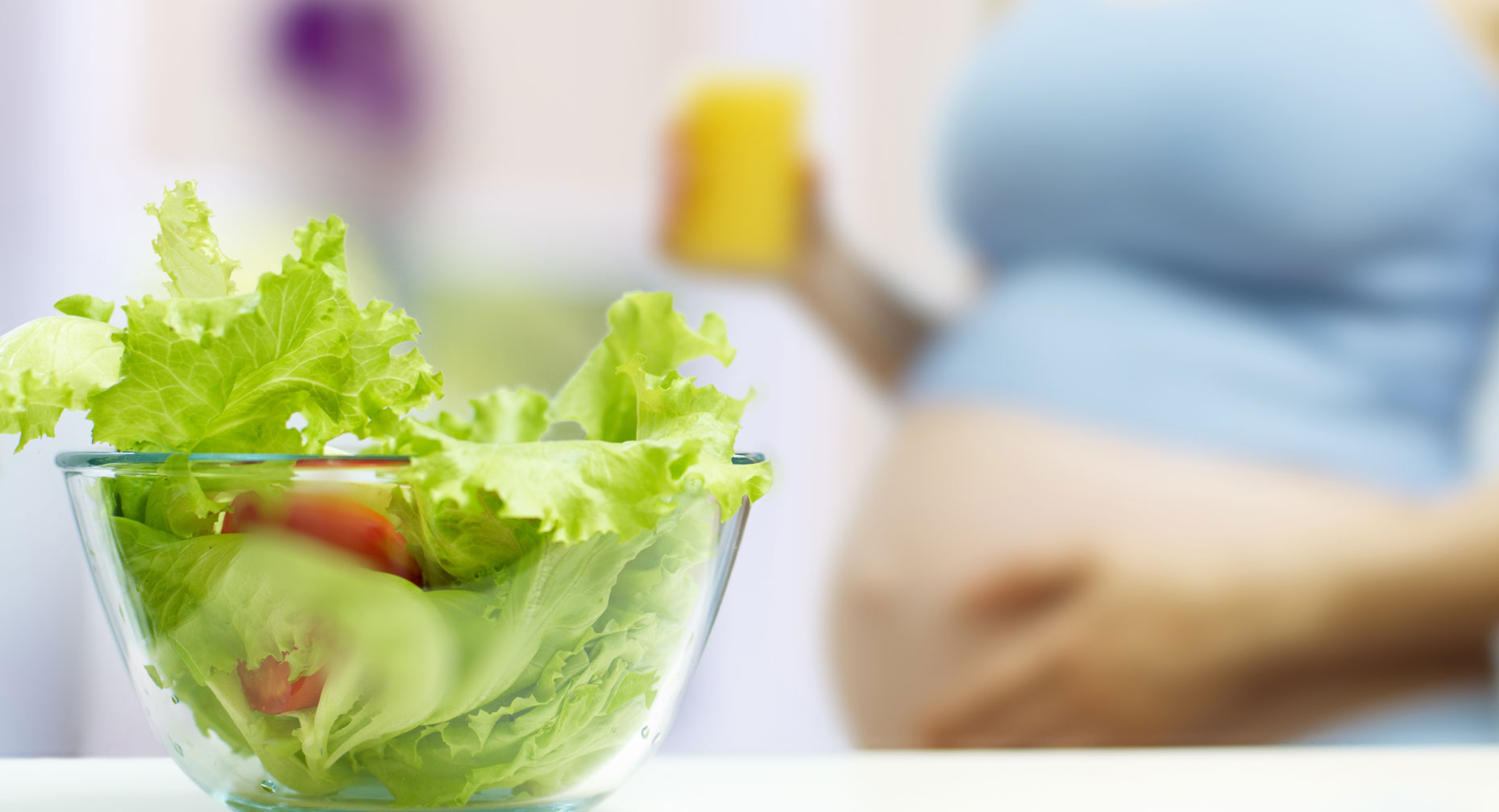- Baby on the Way
- Diet and Nutrition
- Health Topics
- Prenatal Care
- Special Health Conditions
- Staying Healthy
Food Matters When You’re Eating For Two

Find Your Perfect Match
Answer a few questions and we'll provide you with a list of primary care providers that best fit your needs.
You’re probably tired of hearing “You’re eating for two now.” But it’s true — and from the very start, even before conception, your diet has an impact on your baby’s health.
The importance of good nutrition during pregnancy helps your baby grow to a healthy, appropriate size, and helps keepyour own weight in check. Poor nutrition can impact the development of the fetus, explains dietitian Allison Danko, MS, RDN. Birth defects, gestational diabetes, preeclampsia, and premature birth are all possible results, she says.
What To Eat, And How Much
Eating for two doesn’t necessarily mean eating a lot of food; it’s all about eating the right amount of the right foods. “In general, most pregnant women need about 400 to 500 additional calories a day during their second and third trimester,” says Danko. To support a healthy pregnancy, she recommends getting your additional calories from the following, which are rich in important vitamins and minerals:
- Plant foods. Fruits, vegetables, whole grains, nuts, legumes
- Healthy fats. Olive oil, nut butters, avocado
- Proteins. Meat, poultry, eggs, seafood, soy, dairy, nuts, legumes
Ask your doctor how much weight you should gain during pregnancy and how many calories you should consume. It’s different for every woman, depending on your weight prior to conception and other health factors.
Your Pregnancy Must-Have List
Your doctor is likely to prescribe prenatal supplements, which are “intended to fill any nutritional gaps in your diet and account for increased demands during pregnancy,” says Danko. Supplements should not be used to replace proper nutrition, she adds. Important nutrients include:
- A well-balanced diet. Your diet should consist of protein, fruits, vegetables, and whole grains, with sweets and fats kept to a minimum. A healthy diet also can help to reduce unpleasant symptoms, like nausea and constipation.
- Folic acid. If you're of childbearing age, you should consume 400 micrograms (0.4 mg) of folic acid each day. Folic acid is found in some green leafy vegetables, most berries, nuts, beans, citrus fruits, fortified breakfast cereals and some vitamin supplements. It can help reduce the risk for birth defects of the brain and spinal cord (called neural tube defects).
- Iron. Pregnant women need at least 27 milligrams of iron a day. Recommended foods include red meat, chicken and fish (see below for warnings about some seafood), fortified cereals, spinach, some leafy greens, and beans. If you are vegetarian or don’t eat a lot of meat, increase your body’s absorption of iron by combining plant-based sources of iron with vitamin C-rich foods. For example, try spinach salad with mandarin oranges or fortified cereal with strawberries.
- Calcium. The development of your baby's teeth, bones, heart, nerves and muscles depends on calcium — so much so that if you don’t consume enough, it is taken from your bones for the baby. The recommended amount of calcium during pregnancy is 1,300 milligrams per day for adolescents 14 to 18 years old and 1,000 milligrams per day for women ages 19 to 50. That means at least three daily servings of calcium-rich foods such as low-fat or fat-free milk, yogurt or cheese (see warnings, below, about some dairy products), dark green leafy vegetables, or calcium-fortified cereals and juices.
- Fluids. You can take in enough fluids by drinking eight to 12 cups of water each day, in addition to the fluids in juices and soups. Talk to your doctor about restricting your intake of caffeine and artificial sweeteners. All alcohol should be avoided.
- Additional nutrients needed: Choline (450 milligrams daily) plays a role in brain development and cognitive functioning. Iodine (220 micrograms daily) is important for the growth and development of your baby’s nervous system and supports proper thyroid function. Zinc (8 milligrams daily while trying to conceive; 11 milligrams daily during pregnancy) is involved in gene regulation, protein synthesis, and the immune system’s development. Vitamin D (600 international units daily) is also essential. Low Vitamin D in mothers has been associated with neonatal rickets and preterm birth, as well as maternal gestational diabetes and preeclampsia.
Folic acid is most helpful during the first 28 days after conception. This is when most neural tube defects happen. Unfortunately, many women do not realize they are pregnant before 28 days. Therefore, begin taking folic acid before conception and continue through pregnancy.
Food Dangers And Precautions
If you’re pregnant, be aware of these dangers that may be lurking in your food:
- Listeria. A dangerous bacterium that can grow even in cold refrigerators
- Mercury. A harmful metal found in high levels in some fish
- Toxoplasmosis. A risky parasite found in undercooked meat and unwashed fruits and vegetables
All of these things pose a risk to the health of you and your baby, and can even result in death. It’s important to avoid:
- Unpasteurized milk, and foods made with unpasteurized milk
- Soft cheeses, including feta, queso blanco, fresco, Camembert, brie, or blue-veined cheeses (unless labeled “made with pasteurized milk")
- Hot dogs and luncheon meats, unless they’re heated until steaming hot before serving
- Refrigerated pâté and meat spreads
- Raw and undercooked seafood (including smoked seafood), eggs, and meat. Do not eat sushi made with raw fish. (Cooked sushi is safe.)
Some additional notes about seafood:
- Consume at least eight to 12 ounces of a variety of seafood per week.
- The safest fish to eat are those low in Methylmercury. Avoid shark, swordfish, and king mackerel.
In addition, when preparing food, don’t forget to:
- Wash. Rinse all raw produce thoroughly under running tap water before eating, cutting, or cooking.
- Clean. Thoroughly wash your hands, knives, countertops, and cutting boards after handling and preparing uncooked foods.
- Cook. Beef, pork, seafood, and poultry should be cooked to a safe internal temperature using a food thermometer.
- Chill. Promptly refrigerate all perishable food.
If you have questions about your diet or nutrition, your doctor can refer you to a registered dietitian, who will ask you to keep a food diary for several days. A dietitian can help you develop a personalized nutrition plan based on your unique needs.
Find Your Perfect Match
Answer a few questions and we'll provide you with a list of primary care providers that best fit your needs.
Source: U.S. Department of Health and Human Services, Office of Women’s Health; Academy for Nutrition and Dietetics; Centers for Disease Control; Allison Danko, MS, RDN; HHS Dietary Guidelines for Americans, 2020-2025





